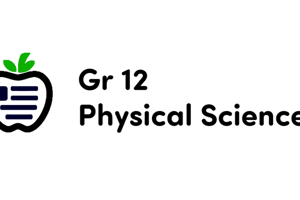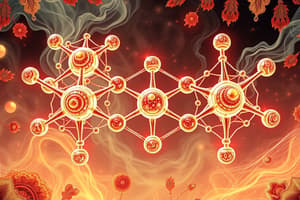Podcast
Questions and Answers
What type of intermolecular force is a hydrogen bond?
What type of intermolecular force is a hydrogen bond?
- Dipole-dipole Force (correct)
- Ion-dipole Force
- London Dispersion Forces
- Dispersion Forces
Which intermolecular force involves an interaction between an ion and the charge end of another molecule?
Which intermolecular force involves an interaction between an ion and the charge end of another molecule?
- London Dispersion Forces
- Hydrogen Bond
- Dipole-dipole Force (correct)
- Dispersion Forces
What type of intermolecular force occurs between molecules with temporary dipoles?
What type of intermolecular force occurs between molecules with temporary dipoles?
- Ion-dipole Force
- Hydrogen Bond
- London Dispersion Forces (correct)
- Dipole-dipole Force
In which intermolecular force do the dispersion forces increase with molar mass or atomic size?
In which intermolecular force do the dispersion forces increase with molar mass or atomic size?
What is the strength of the ion-dipole intermolecular force?
What is the strength of the ion-dipole intermolecular force?
Which intermolecular force involves an interaction between molecules with partially positive hydrogen and partially negative oxygen?
Which intermolecular force involves an interaction between molecules with partially positive hydrogen and partially negative oxygen?
What is the dominant intermolecular force present in a molecule where hydrogen is bonded to oxygen, nitrogen, or fluorine?
What is the dominant intermolecular force present in a molecule where hydrogen is bonded to oxygen, nitrogen, or fluorine?
Which intermolecular force is characteristic of a molecule in a saline solution?
Which intermolecular force is characteristic of a molecule in a saline solution?
In a polar molecule, what is the secondary intermolecular force present after hydrogen bonding?
In a polar molecule, what is the secondary intermolecular force present after hydrogen bonding?
Which intermolecular force is dominant in non-polar molecules?
Which intermolecular force is dominant in non-polar molecules?
What is the primary intermolecular force present in a molecule with partially positive hydrogen attached to an electronegative atom?
What is the primary intermolecular force present in a molecule with partially positive hydrogen attached to an electronegative atom?
In a polar molecule, what is the dominant secondary intermolecular force after hydrogen bonding?
In a polar molecule, what is the dominant secondary intermolecular force after hydrogen bonding?
What type of intermolecular force exists between polar covalent molecules?
What type of intermolecular force exists between polar covalent molecules?
Which type of intermolecular force is specifically found in molecules containing hydrogen bonded to F, O, or N?
Which type of intermolecular force is specifically found in molecules containing hydrogen bonded to F, O, or N?
What type of intermolecular force becomes stronger as the charge on the ion increases?
What type of intermolecular force becomes stronger as the charge on the ion increases?
In which type of intermolecular force does the hydrogen atom acquire a large partial positive charge?
In which type of intermolecular force does the hydrogen atom acquire a large partial positive charge?
Which force is NOT a type of intermolecular force mentioned in the text?
Which force is NOT a type of intermolecular force mentioned in the text?
When does the Dipole-Dipole Force occur between neighboring molecules?
When does the Dipole-Dipole Force occur between neighboring molecules?
Study Notes
Types of Intermolecular Forces
- Intermolecular forces are interactions between molecules
- London Dispersion Forces: an interaction between molecules with temporary dipoles
- Results from a shift in the position of the electrons, causing one end to be more negative and the other end to be more positive
- Found in non-polar molecules
- Increase with the molar mass or atomic size
- Increase with the number of dipoles
- Ion-Dipole Forces: an interaction between an ion and the charge end of another molecule
- Strength: strong
- Hydrogen Bond: a special type of dipole-dipole formed between partially positive hydrogen and a neighboring molecule with partially negative oxygen
- Found in substances containing N-H, O-H, and H-F
- Strength: medium
- Dipole-Dipole Forces: an interaction between two polar molecules other than N-H, O-H, and H-F
- Strength: medium
- Dispersion Forces: an interaction between molecules with temporary dipoles
- Strength: weak to very weak
Predicting Intermolecular Forces
- To predict the intermolecular force present in a molecule:
- Determine the polarity of the molecule
- Identify the type of intermolecular force present based on polarity
- Polarity:
- Polar molecules: have a permanent dipole moment
- Non-polar molecules: do not have a permanent dipole moment
- Intermolecular force identification:
- Ion-Dipole Force: ion and polar molecule
- Hydrogen Bond: polar H bonded to O, N, or F
- Dipole-Dipole Force: polar molecules
- Dispersion Force: non-polar molecules
Examples of Intermolecular Forces
- HCl: Dipole-Dipole Force; London Dispersion Forces
- I2: London Dispersion Forces
- HBr: Dipole-Dipole Force; London Dispersion Forces
- saline sol’n: Ion-Dipole Force; Hydrogen Bond; Dipole-Dipole Force; London Dispersion Forces
- HF: Hydrogen Bond; Dipole-Dipole Force; London Dispersion Forces
Studying That Suits You
Use AI to generate personalized quizzes and flashcards to suit your learning preferences.
Description
Test your knowledge on intermolecular forces by identifying the main force present in various molecules such as HCl, I2, HBr, saline solution, and HF. Understand concepts like ion-dipole forces, hydrogen bonds, dipole-dipole interactions, and London dispersion forces.




